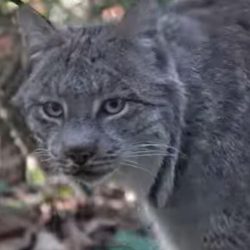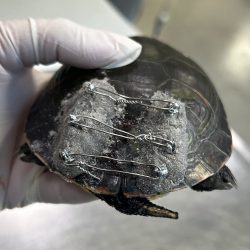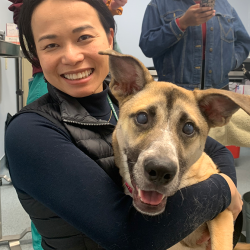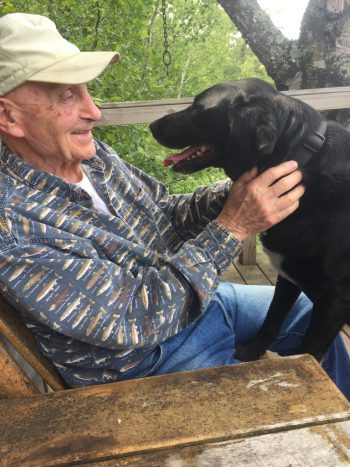
When Ron Mason answered an advertisement for chocolate Labrador puppies, admittedly an impulse decision, he had no idea that his new one-white-pawed girl would not only light a very dark time in his life but also provide him and his family with a beloved companion they didn’t know they needed.
Throughout her 9.5 years as Ron’s girl, Annie has led a busy, content life. “She’s a happy dog who loves people and loves to play,” says Ron. “We walk and play every day. I throw balls and sticks that she then catches or retrieves. And she protects me fiercely—though it’s all bluster. She really is a gentle dog with a very sweet disposition. It’s no exaggeration that she kept me sane during the two years of COVID isolation.”
The phrase “man’s best friend” takes on a whole new meaning with Ron and Annie. One look at the two of them shows that they share something special, a bond that no words can do justice nor photos can quite capture (though many come close). When a human and animal have the privilege of growing so in tune with one another, it can be rather obvious, and scary, when one’s companion seems off.
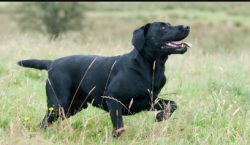
That’s why Ron knew something was up when Annie suddenly became very subdued while playing. His hunch was confirmed when Annie then vomited out of nowhere. “I was concerned about a possible gastric outlet obstruction,” says Ron. “I looked for a veterinary clinic with an endoscope and was referred to the Michigan State University Veterinary Medical Center’s Small Animal Emergency Clinic. By the time I drove the two hours there, Annie’s condition had deteriorated severely.”
Annie was presented to the MSU Emergency and Critical Care Medicine Service (ECCM) for lethargy and possible stomach obstruction. On presentation, she was dull and had muffled heart sounds. So, the MSU ECCM team performed a brief (or focal) ultrasound; pericardial effusion was present (the buildup of too much fluid in the structure around the heart), and the fluid was emergently removed. Unfortunately, fluid isn’t all that was found on ultrasound: there also was a large mass on the right side of Annie’s heart. This caused the pericardium to quickly refill with fluid. To help keep her chest free from fluid, a pericardial catheter was placed. Annie was then hospitalized for further diagnostics and treatment. Translation: she was sick, but she was stable. The next step was to further investigate what made her so ill.
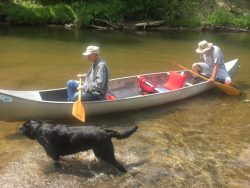
A CT scan confirmed the large mass on the right side of Annie’s heart, an infarcted spleen (when blood flow to the spleen is compromised), and nodules on her liver and muscles. Ultimately, with Ron’s input, the decision was made to take Annie to surgery, where she underwent a splenectomy, liver biopsy, and pericardiectomy and serosal patch (a technique used to either close intestinal perforations or reinforce a visceral incision line) of the mass. The ordeal was something no veterinary professional wants an animal to experience, nor put a pet parent through.
Even then, Ron appreciates Annie’s medical team. “Dr. Henke merits special mention,” says Ron. “As I was registering at the Clinic, Dr. Henke picked Annie up and carried her to a treatment area. He then quickly made the correct diagnosis and immediately began to treat Annie. Without this timely intervention, my girl certainly would have passed that day. He also completely understood my love for her and my grief. He even brought me tissues to dry my tears. I can’t ever thank him enough. He is an exceptional, caring person.”
Once Annie was stable, she was transferred to MSU’s Radiation Oncology Service. Based on her history, imaging, and liver biopsy results, Annie was diagnosed with atrial hemangiosarcoma, a cancer of the blood vessels; the spleen and the right atrium are the most common primary locations.
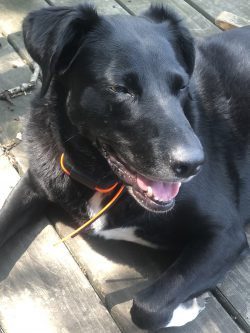
“This tumor originates from the endothelial cells, which line the blood vessels,” says Dr. Leanne Magestro, clinician for the MSU Radiation Oncology Service. “Hemangiosarcoma has the propensity to make many immature, friable vascular spaces within the mass, thus the risk for rupture and hemorrhage is high. Unfortunately, this cancer also readily spreads to other places in the body such as the lungs, liver, and mesentery. Most dogs’ lives are limited due to poorly controlled bleeding of either the primary or metastatic tumors; many live only a few months.”
The good news was, the MSU Cardiology Service—as well as ECCM and Soft Tissue Services—had already performed several miracles on Annie. Though uncommon, they achieved the goal of causing pressure locally around the tumor but not cardiac tamponade, which means they stopped the uncontrolled bleeding that would put Annie’s heart at risk. The other good news was that additional treatment options were available: chemotherapy or radiation therapy with or without chemotherapy. Under Dr. Magestro’s guidance, Ron elected radiation therapy with chemotherapy, the plan that would allow Annie to be the most comfortable and provide the best chance of a longer, good quality life.
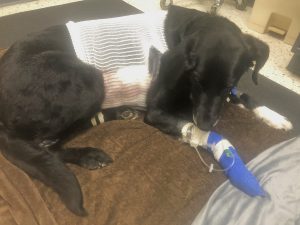
“Like Dr. Henke, Dr. Magestro also merits special mention. She devised Annie’s treatment protocol and patiently explained the plan to me. She provided the radiation therapy and subsequent chemotherapy. Her demeanor is pleasant, and her care of Annie has been superb.”
19 days after she was admitted to the Hospital—19 days after Ron thought he would lose his best friend—Annie was discharged from the Hospital. Still undergoing chemotherapy treatment at MSU, Annie remains alive and well, living her best dog life, never too far from Ron. Thanks to the plan devised by Dr. Magestro, based on a new protocol created by the University of Wisconsin, the mass in Annie’s right atrium has significantly decreased in size.
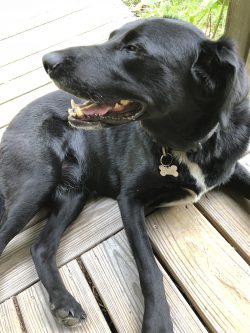
Throughout Annie’s 19 days in the Hospital, she was given 6 diagnoses (metastatic hemangiosarcoma, right-sided heart mass and pericardial effusion, hepatic hemangiosarcoma, splenectomy, septic thorax, hyporexia), underwent countless procedures including transfusions and surgery, was cared for by 4 different services (ECCM, Cardiology, Soft Tissue Surgery, and Radiation Oncology), made many friends, and she and Ron gained a family. He also gained more time with his Annie
“Be proud of your facility, its physicians, and entire staff,” says Ron. “Annie received awesome care, which will extend her life. We will have more time together and that is everything to me. It is impossible to ask for more.”
When asked what Ron loves most about Annie, he comments: her special spirit. When asked how he feels about getting more time with her, he responds: overjoyed.

